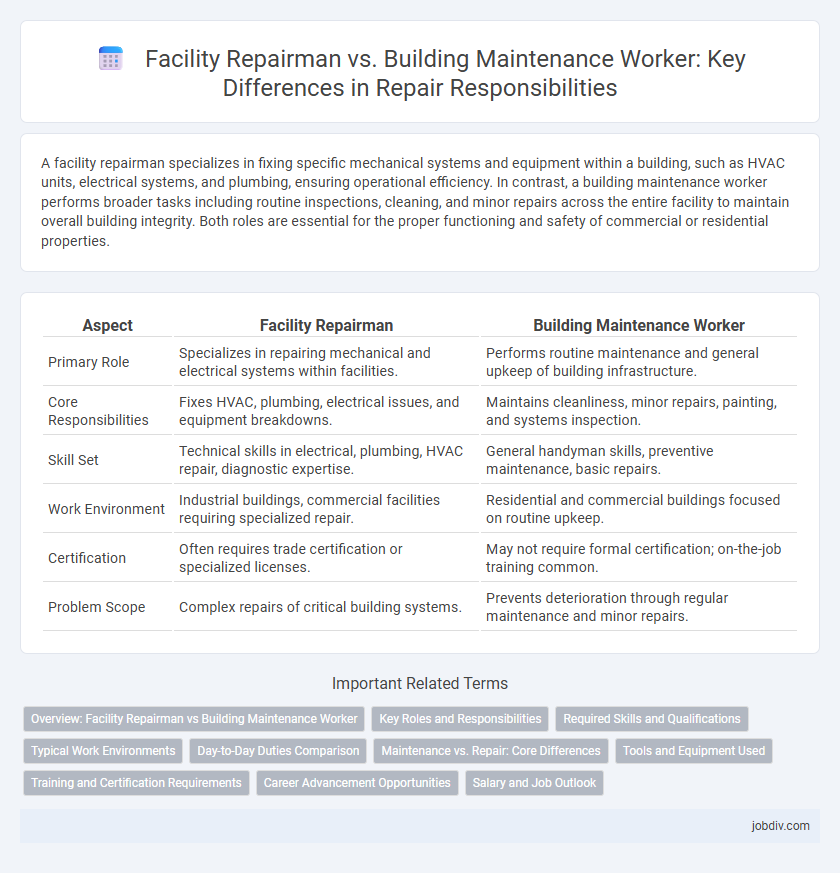A facility repairman specializes in fixing specific mechanical systems and equipment within a building, such as HVAC units, electrical systems, and plumbing, ensuring operational efficiency. In contrast, a building maintenance worker performs broader tasks including routine inspections, cleaning, and minor repairs across the entire facility to maintain overall building integrity. Both roles are essential for the proper functioning and safety of commercial or residential properties.
Table of Comparison
| Aspect | Facility Repairman | Building Maintenance Worker |
|---|---|---|
| Primary Role | Specializes in repairing mechanical and electrical systems within facilities. | Performs routine maintenance and general upkeep of building infrastructure. |
| Core Responsibilities | Fixes HVAC, plumbing, electrical issues, and equipment breakdowns. | Maintains cleanliness, minor repairs, painting, and systems inspection. |
| Skill Set | Technical skills in electrical, plumbing, HVAC repair, diagnostic expertise. | General handyman skills, preventive maintenance, basic repairs. |
| Work Environment | Industrial buildings, commercial facilities requiring specialized repair. | Residential and commercial buildings focused on routine upkeep. |
| Certification | Often requires trade certification or specialized licenses. | May not require formal certification; on-the-job training common. |
| Problem Scope | Complex repairs of critical building systems. | Prevents deterioration through regular maintenance and minor repairs. |
Overview: Facility Repairman vs Building Maintenance Worker
Facility repairmen specialize in troubleshooting and fixing mechanical, electrical, and plumbing systems within commercial or industrial settings. Building maintenance workers handle a broader scope, including routine upkeep, cleaning, and minor repairs to ensure overall building functionality and safety. Both roles are essential for maintaining operational efficiency but differ in scope and specialization.
Key Roles and Responsibilities
Facility repairmen specialize in fixing and maintaining mechanical systems, plumbing, electrical components, and HVAC units within commercial or industrial buildings. Building maintenance workers perform broader upkeep tasks, including janitorial duties, minor repairs, groundskeeping, and ensuring overall safety compliance. Both roles require hands-on troubleshooting skills, but facility repairmen focus more on technical repairs, while building maintenance workers emphasize general facility care and operational support.
Required Skills and Qualifications
A Facility Repairman requires expertise in troubleshooting HVAC systems, electrical wiring, and plumbing, often holding certifications such as EPA Universal or electrician licenses. Building Maintenance Workers must possess broad skills including carpentry, painting, and routine equipment inspections, typically needing a high school diploma and on-the-job training. Both roles demand strong problem-solving abilities, physical stamina, and familiarity with safety regulations to ensure efficient and safe facility operations.
Typical Work Environments
Facility repairmen typically work in industrial plants, manufacturing facilities, and large commercial buildings where they maintain machinery and equipment. Building maintenance workers perform tasks in residential buildings, office complexes, and schools, focusing on general upkeep such as plumbing, electrical systems, and HVAC. Both professions require adaptability to varying indoor environments, but facility repairmen often face more specialized and technical settings compared to building maintenance workers.
Day-to-Day Duties Comparison
Facility repairmen focus on diagnosing and fixing mechanical, electrical, or structural issues within a facility, often handling specialized equipment repairs and preventive maintenance. Building maintenance workers perform routine upkeep tasks such as cleaning, painting, landscaping, and minor repairs to ensure the facility operates smoothly and remains visually appealing. Both roles require proactive monitoring of building systems but differ in technical depth and scope of responsibilities.
Maintenance vs. Repair: Core Differences
Facility repairmen specialize in fixing and restoring equipment or structural elements after damage or malfunction, focusing on immediate problem resolution and functionality restoration. Building maintenance workers concentrate on routine inspections, preventative upkeep, and minor repairs to ensure continuous system performance and extend asset lifespan. The core difference lies in repairmen addressing specific breakdowns, whereas maintenance workers prioritize ongoing care to prevent such issues.
Tools and Equipment Used
Facility repairmen primarily use specialized tools such as welding equipment, electrical testing devices, and plumbing snakes to address complex mechanical and infrastructural issues. Building maintenance workers focus on general repair tools including hand tools like hammers, screwdrivers, and power tools such as drills and saws for routine upkeep tasks. Both professionals utilize safety gear like gloves and goggles, but facility repairmen often require more advanced diagnostic equipment to troubleshoot and fix technical systems.
Training and Certification Requirements
Facility repairmen typically require specialized training in mechanical systems, electrical work, and HVAC, often completed through vocational schools or apprenticeships. Building maintenance workers may have broader, less specialized training focusing on general repairs and upkeep, with certifications like OSHA safety training or EPA refrigerant handling. Certification requirements for facility repairmen often demand industry-recognized credentials such as HVAC certification or electrical licenses, whereas building maintenance workers benefit from certifications in preventive maintenance and safety compliance.
Career Advancement Opportunities
Facility repairmen often have specialized skills in mechanical, electrical, or HVAC systems, offering clearer pathways to advanced technical certifications and supervisory roles. Building maintenance workers benefit from broader experience across multiple trades, which can lead to positions in facility management and project coordination. Both career paths provide opportunities for upward mobility, but facility repairmen typically advance through technical expertise while maintenance workers progress via diverse operational knowledge.
Salary and Job Outlook
Facility repairmen typically earn a median annual salary of around $40,000, with job growth projected at 5% over the next decade. Building maintenance workers have a slightly lower median wage near $35,000 but benefit from a faster employment growth rate of approximately 7%. Both positions require skills in equipment repair and upkeep, yet the demand for building maintenance workers is rising more rapidly due to increased focus on facility operations and safety compliance.
Facility Repairman vs Building Maintenance Worker Infographic

 jobdiv.com
jobdiv.com